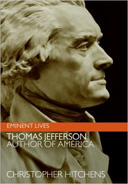
 |
Thomas Jefferson: Author of America
by Christopher Hitchens
HarperCollins
Although the iconic Thomas Jefferson has been unveiled by many historians, he was never an enigma. Known as the author of The Declaration of Independence and to some degree as the first great expansionist U.S. President, he embodied the dichotomy of the new American: a man who held fast to his ideals and liberty and who rose to the heights of erudition while sinking to the depths of politics. He was the most desired person at a party and among the least desirable as an enemy. He was perhaps the perfect subject for journalist Hitchens, who could tee-up any argument and make one pay for a mistake in the debate.
To sculpt Jefferson’s biography, Hitchens draws on the official documents, but works in equal measures with the previous biographical texts, the opinions of Jefferson’s supporters and detractors, and of course the author's own famous point of view. He perceives Jefferson as a forthright idealist who embraced European sophistication as much as he despised its terminal outcome of aristocracy. This often found Jefferson either brooding or politically bloodthirsty, given to long periods of seclusion and meditation, with as much time brokered for political persuasion and laying spring traps for his enemies. Jefferson was most definitely a means-to-an-end person, the collateral damage of friendships and circumstance be damned.
In his personal life, Jefferson did not escape this conflicted behavior. It is well-documented that he burned the slavery candle at both ends. He lobbied for its abolition at various points of his political life, while owning slaves and maintaining a secret affair with Sally Hemings until his death. (Being the half-sister of his deceased wife, one wonders if Jefferson did not see his beloved Martha’s face in Sally’s.) In addition to these moral quandaries, the insolvency of his financial affairs spilled over into his conduct as the Executive-in-Chief of the fledgling United States, preparing the country for a repeated history of crippling debt. Still, it's difficult to imagine the breadth, might, and magnanimity of the U.S. without the ambition of Jefferson.
Hitchen’s biography is compact yet rich, filled with the pointed arguments and humor that one enjoyed in his other writings. For a tight biography, the narrative is well-paced and more balanced than one might expect in a Hitchens piece. While there are moments of kinship and homage, the author dutifully delivers more than a welcome addition to the Life of Jefferson library. He has written a worthy starting point for Jefferson students, as we understand him through the lens of time.
RECOMMENDED by the US Review
Next Focus Review
Previous Focus Review